Items
Tag is exactly
healthcare
-
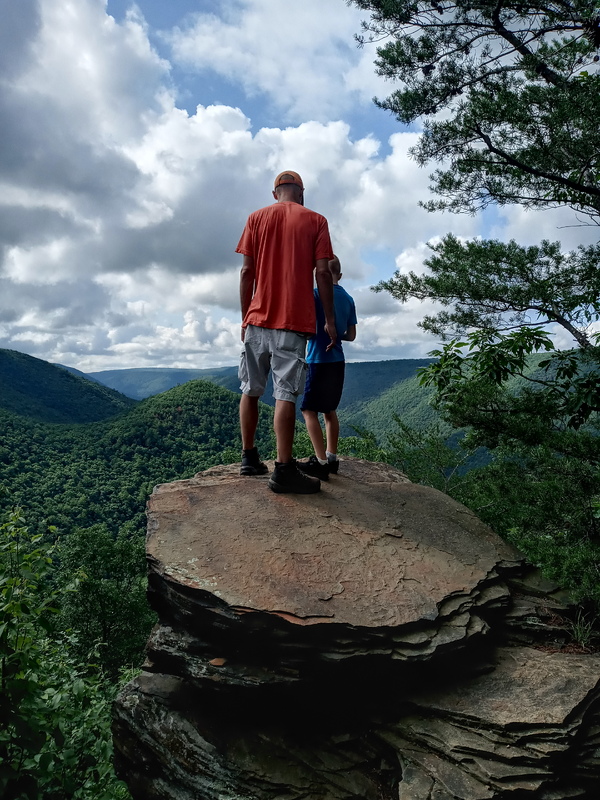 2021-05-15
2021-05-15A Measure of Peace During a Global Pandemic
During the COVID-19 pandemic I was working in health care for an agency. This meant that I traveled from facility to facility where there were staffing shortages and predominantly worked in the covid units. It was a strange experience to travel across Pennsylvania during this time and have little to no traffic that would typically have existed were there not any restrictions enacted. Therefore, when the restrictions were lifted, I did not feel an urge to travel to any great extent as I never stopped working during the lockdowns and if anything, my hours were significantly increased to the point of constant exhaustion. However, when the restrictions were lifted, I found myself in need of outdoor therapy. I am an avid hiker and enjoy the silence that trails offer. I have found that my favorite trail to visit is the Golden Eagle Trail, or as my children refer to it “Rattlesnake Ridge.” While the restrictions were lifting in most places at the time, I hardly noticed because in health care they remained for a much longer period. On many occasions in 2021, my family accompanied me to the Golden Eagle Trail to step away from society and unwind as a family without feeling the pressure of all the changes that were brought about by the pandemic. These trips provided me with lasting memories of my son reaching for my hand for security when walking along a thin train with a steep drop alongside it, my husband helping steady me across slippery rocks, and more. The photos from these trips are everlasting reminders of the happiness that hiking, especially with my family, bring me. Moments like these are to me the important moments in life. -
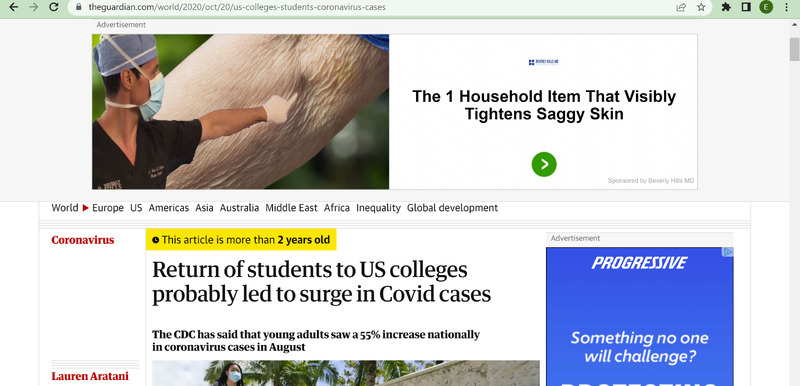 2020-10-20
2020-10-20How covid affected NYC?
Covid has affected everyone by the way you live your everyday life. Covid has affected New york city in many different ways , For example covid affected business to close down months including schools . Schools having to go remote . Another way New york city has been affected by the transit , The transit systems like the trains ,buses and commuter rail and ferries as a result to this the transportation has plummeted . For the subways in New York City it went down 90 percent and the buses went down 75 percent. The reason for this happening is people in quarantine and not going to work since some are working from home . Covid has affected health care workers. For example health care workers like doctors and nurses are around people who have it so they are more prone to get it. .This pandemic caused a lot of changes in the world. It caused everyone to be less social and not go out as much as it caused us to wear masks everywhere. It also caused a lot of people mental and emotional health to go down. For example there’s been a lot of social isolation which caused families to not be able to see each other as often. COVID-19 has impacted social mobility on child care cost and for families school dropout rate has increased due to fear of getting Covid. COVID-19 especially affected families due to not having jobs or working from home or being put on unemployment there’s been a big impact of Covid on families and family relationships creating a lot of tension and feeling depressed or not being united together. These pandemic parts of the population in different situations continue to affect people living in poverty situations with older people and disabilities. A lot of people have been put on unemployment and not being able to pay the rent. Covid has caused a lot of deaths and people could not be able to bury their loved ones. During The beginning of the year when the Pandemic was occurring depending on the situation of others some people were probably affected mentally Health care was provided to those who really needed it due to people not being able to pay for it and The state of new york lost money as well , It affected relationships and people got help by going therapy and staying connected to people . This pandemic affected many people personally. Covid has affected everyone's plan including travel because there's been travel bans and going to the airport has a lot of restrictions. A Lot of businesses are closing down to this pandemic by not giving income . Due to health care a lot of pregnant women had very high dress levels that affected their pregnancy . Which caused health care workers to be very aware of what was going on . Their risking their own lives to help us and young teens and kids were not able to fully able to enjoy the success of completing in graduating either high school such as prom or etc.it affected everyone's life and still is . This has caused a lot of stress and tension but has allowed people to be stronger in a sense and to appreciate the little things in life . Covid 19 has caused many hardships including loss of jobs . Some questions that still remain on this subject would be , When are things going back to normal ?, When is the vaccine coming out to prevent this ? When will this end ?. A message of hope i would say is everything will get better with time. The productivity has been slow due to employment going down ,People losing jobs . my personal experience with covid has become a learning experience . For example this pandemic has showed me to not take things for granted . -
2023-01-22
COVID Restrictions and Visiting Mom.
My mother has special needs and since 2014, lived in a townhome with three roommates, facilitated by Penn Foundation, a behavioral healthcare provider. I lived only 10 minutes away, and once a week I would visit her on my days off. I would bring fast food or pizza and we would watch movies together in her room. When the pandemic began, Penn Foundation - like most other healthcare facilities - imposed tight restrictions for the safety of those under their care. As a result, I was unable to visit my mother for half a year, and after restrictions were loosened, our visits were relegated to sitting on her front porch eating and talking. Due to a deterioration in her condition, she was moved to a nursing facility. We never got to have another movie day. The pandemic had changed the way I visit my mother forever. -
 2021-12-28
2021-12-28Pharmacy Technician Shortages
This NBC article goes into detail about the shortage of pharmacy technicians as a result of COVID-19. Drug shortages, staffing shortages, increased demand, and additional responsibilities with little to no training or compensation led to burnout. -
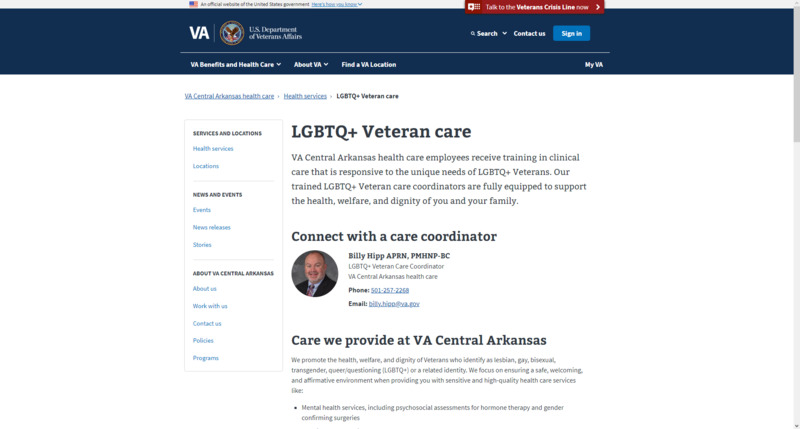 2022-07-11
2022-07-11LGBTQ+ VA Healthcare in Arkansas in the wake of COVID
This is the Arkansas Veterans Affairs website listing specific resources for LGBTQ+ veterans in Arkansas. This site places a specific emphasis on Central Arkansas due to the heavy LGBTQ+ population in that area. In order to combat COVID-19, this site focuses on not only concerted vaccine rollout for LGBTQ+ vets, but also lists mental health resources in order to combat COVID-19. I think this shows a particular vulnerability to a select group and how COVID-19 can reach anyone. Indeed, it is essential that at-risk groups such as the LGBTQ+ community are not overlooked in the age of COVID, and it is encouraging to see the VA take steps to assure this is the case. -
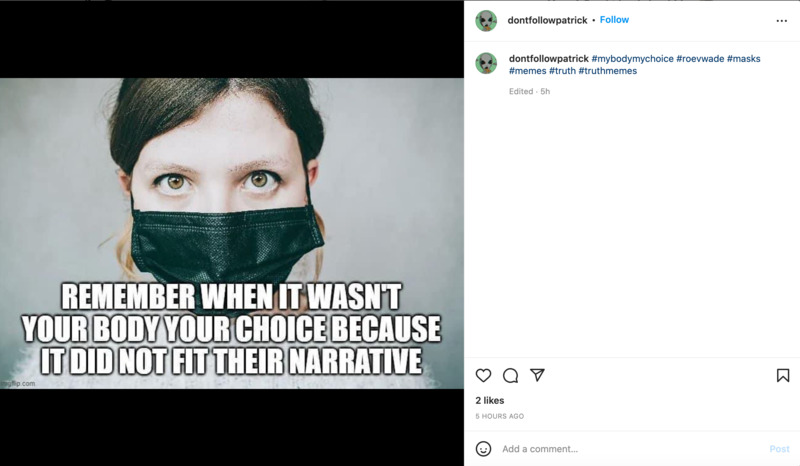 2022-06-26
2022-06-26Remember when it wasn't "your body, your choice"?
This is an Instagram post from dontfollowpatrick. This is a meme posted regarding bodily autonomy. For pandemic skeptics, "my body, my choice" has been common rhetoric with things like masks and vaccines. Dissenters claim that it is not a valid argument because the actions of one person in a public health crisis affect other people around them. With things like abortion, it is seen as an individual decision that does not affect others the way not wearing a mask would. -
 2022-05-12
2022-05-12Covid-19 narrows long-standing Latino mortality advantage, study finds
This is a news story from NBC News by Nicole Acevedo. Latinos have been shown to have lower mortality rates compared to non-Hispanic whites, where they live an average of three extra years. This changed with the virus. In a study published by the Lerner Center for Public Health Promotion, COVID-19 has been shown to kill Latinos 65 or older at 2.1 times the rate of whites in 2020. This number decreased slightly in 2021, which was at 1.6 times the rate of whites. So far this year, it has been at 1.2 times the rate of death. In total, COVID has killed 124,000 Latinos since the start of the pandemic in the United States, which accounts for 17% of deaths. The reason the Latino death rate is high is debated, but some say it is because Latinos in the United States are less likely to have access to quality healthcare or have jobs that would expose them to the virus more often. -
 2022-04-15
2022-04-15Caring for my husband
This is a Twitter update from Shelby_Thom. She says that her husband became a long-haul COVID patient. He got vestibular neuritis, which causes severe dizziness. He is unable to work or drive. He was a healthy 34-year-old too prior to this, but now hits his head a few days after recovery. -
 2022-04-11
2022-04-11It's Not Over Yet
This is a Twitter update from DrLindaMD. This is about a doctor rebutting claims that COVID is over now. She says that she has had five patients in the last week who thought they just had a cold, but it turned out that they had COVID. None of those patients chose to isolate because "it was just a cold." -
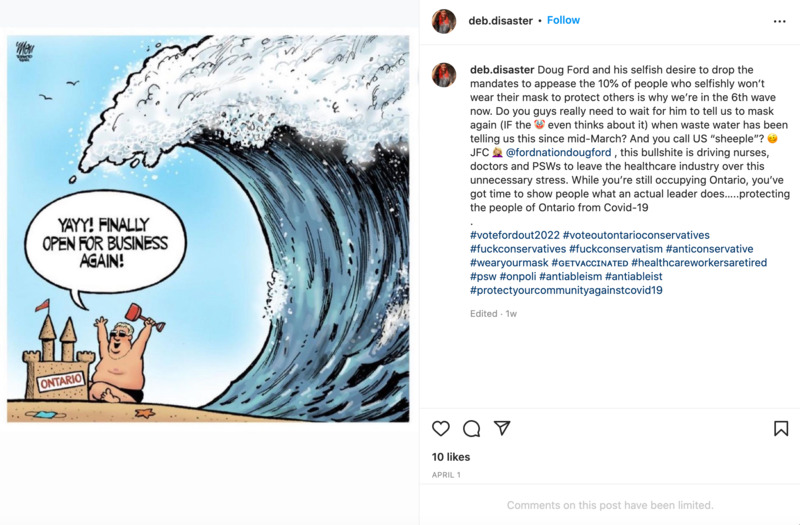 2022-04-01
2022-04-01Doug Ford's Disaster
This is an Instagram post by deb.disaster. This user is criticizing the disaster that Doug Ford has created in Ontario regarding COVID restrictions. They believe that by lifting restrictions to cater to 10% of people in Canada that he is putting people in danger. The comic posted above shows a sandcastle (Ontario) built by Doug Ford and a giant wave (COVID) coming down to destroy it. -
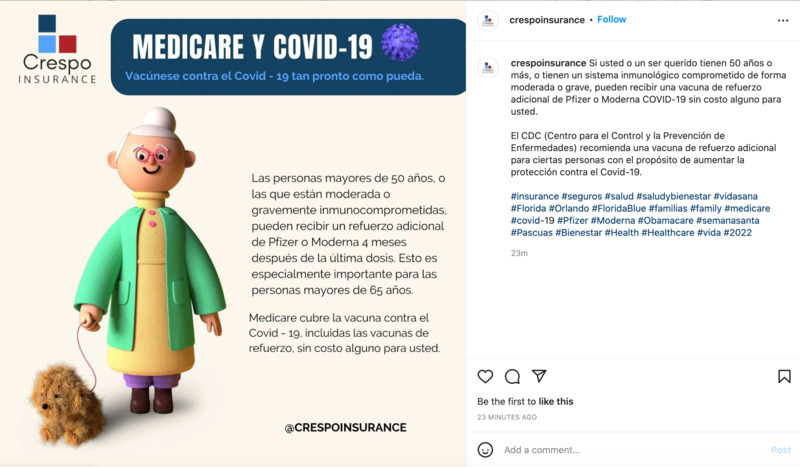 2022-04-11
2022-04-11Medicare Y COVID-19
This is an Instagram post by crespoinsurance. This is a post written in Spanish giving advice to elderly on vaccines. It advises people fifty and older, and those that are immunocompromised to get vaccinated. It also says that Medicare covers COVID vaccines. -
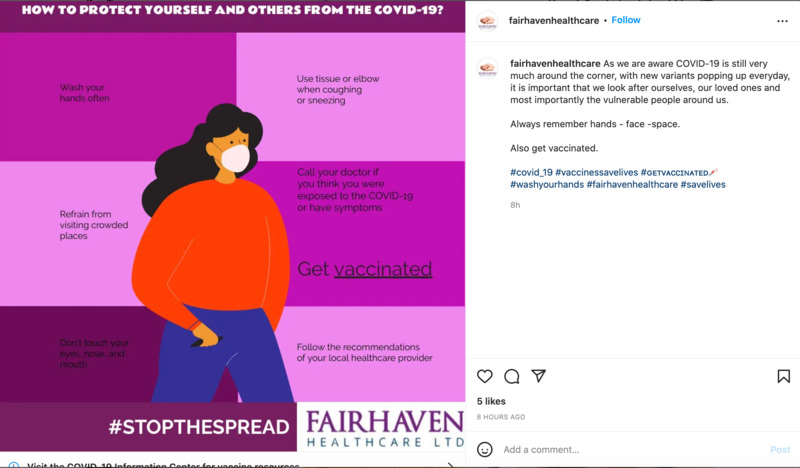 2022-04-07
2022-04-07Ways of Prevention
This is an infographic on Instagram posted by fairhavenhealthcare. This infographic advises people to: use tissues when sneezing or coughing; wash hands often; refrain from crowded places; not to touch hands, mouth, or eyes; follow recommendations from healthcare providers; and get vaccinated. -
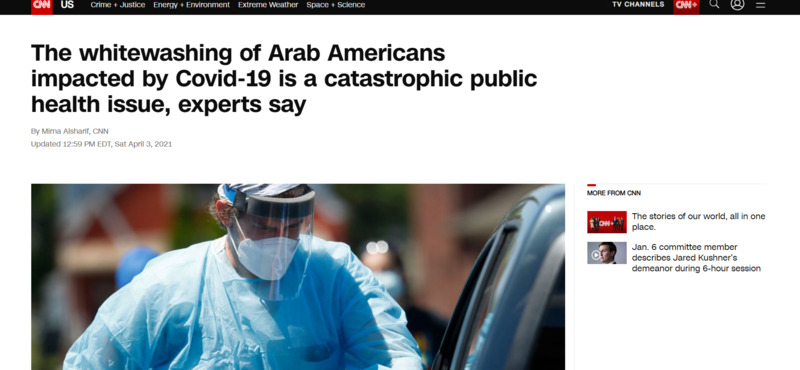 2021-04-03
2021-04-03The whitewashing of Arab Americans impacted by Covid-19 is a catastrophic public health issue, experts say
This article brings up important points regarding the underrepresentation of Middle Eastern and North African (MENA) people and communities in U.S. This article focuses primarily on Arab Americans, but also sheds light on the fact that there are no identifiers for Middle Eastern and North African people on the U.S. Census as their only options are to choose “white” or “other”. As a result, there is a lack of Covid-19 data specific to these communities which prevents support and information being directed to those underrepresented – and often socioeconomically underprivileged – groups. This article is important in demonstrating the vulnerability of this group. Many MENA families live in multi-generational homes, have preexisting medical conditions or risk factors which may make them more vulnerable should they contract Covid, and still some do not have access to the information and support needed to prevent Covid or to receive the proper treatment if infected. Additionally, because MENA people are not able to self-identify on the U.S. Census, the information about how these communities are being affected is not accurate. The U.S. Census isn’t the only place where these identifiers do not exist. Job, scholarship, and college applications (to name only a few) do not provide accurate identifiers for MENA individuals. I think this article is important in revealing the lack of identifiers available to MENA people and how important it is that this is changed soon. -
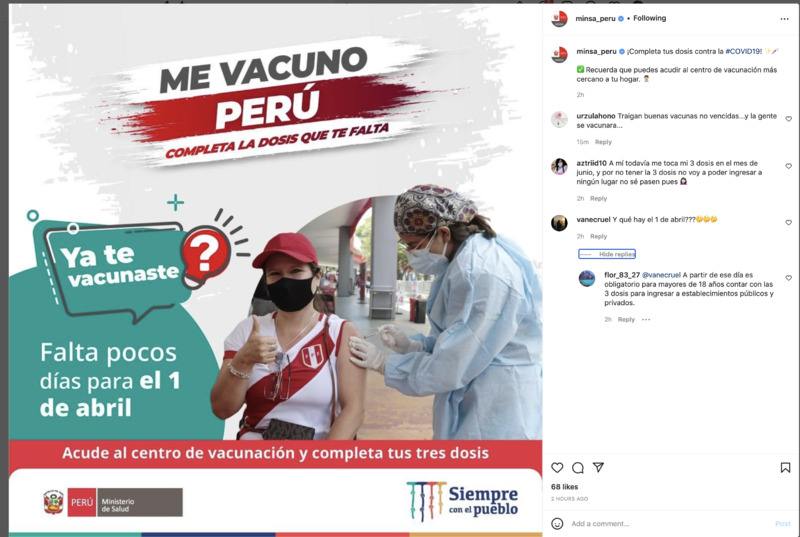 2022-03-30
2022-03-303rd dose is mandatory in Peru
This Instagram post from the ministry of Peru lets people know that they need to head to a vaccination center to receive their 3rd dose of the COVID-19 vaccine. A commenter asked what happens after April 1st? And someone responds that after April 1st it is obligatory for adults over 18 years old to have 3 COVID shots. -
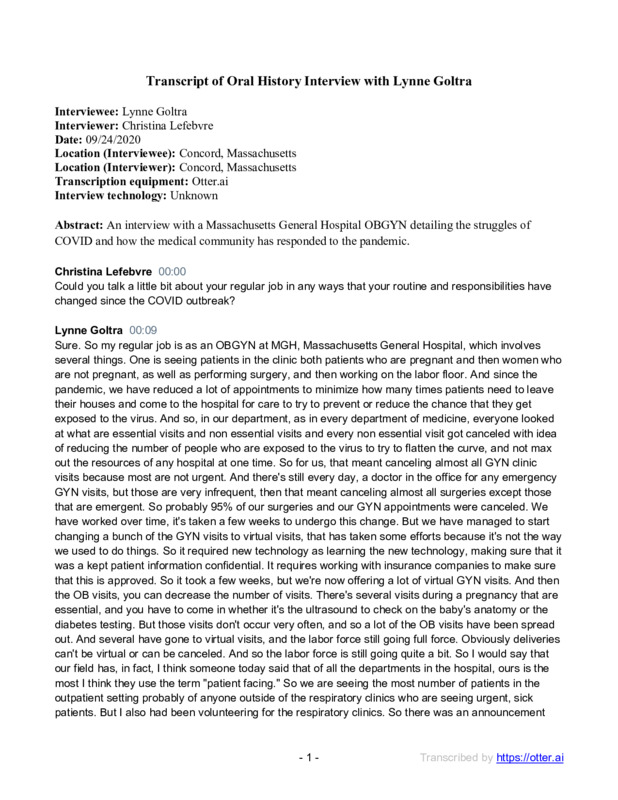 09/24/2020
09/24/2020Christina Lefebvre and Lynne Goltra Oral History, 2020/09/24
An interview with a Massachusetts General Hospital OBGYN detailing the struggles of COVID and how the medical community has responded to the pandemic. -
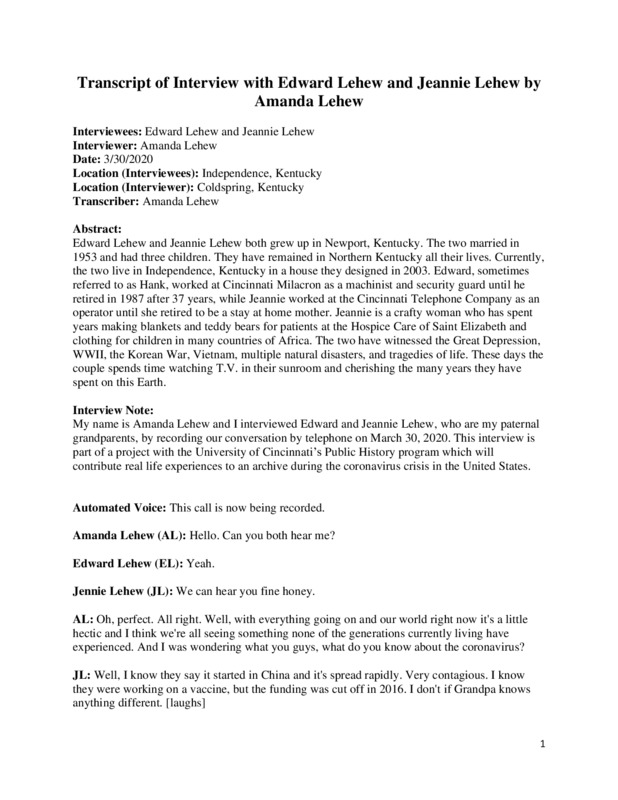 03/30/2020
03/30/2020Jeanie and Edward Lehew Oral History, 2020/03/30
This is interview from Edward and Jeannie Lehew focuses on the COVID-19 pandemic experience in the United States. The Lehews, both born in the 1930s, provide an enriching interview connecting the current pandemic to past historical and personal events ranging from the Great Depression to the loss of an infant grandchild. The Lehews detail many personal life experiences and offer their opinions on the current political and healthcare issues in the United States by explaining how the current presidential administration is at fault for the lack of medical supplies in America. -
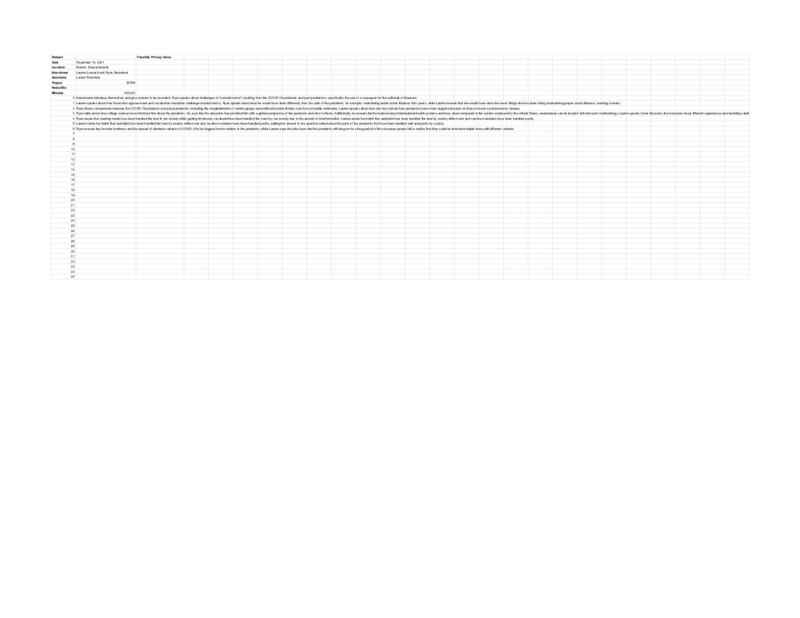 2021-12-10
2021-12-10Lauren Leonard and Ryan BreucknerOral History, 2021/12/10
A discussion with a peer about what we have learned about the COVID-19 pandemic through learning about other pandemics. -
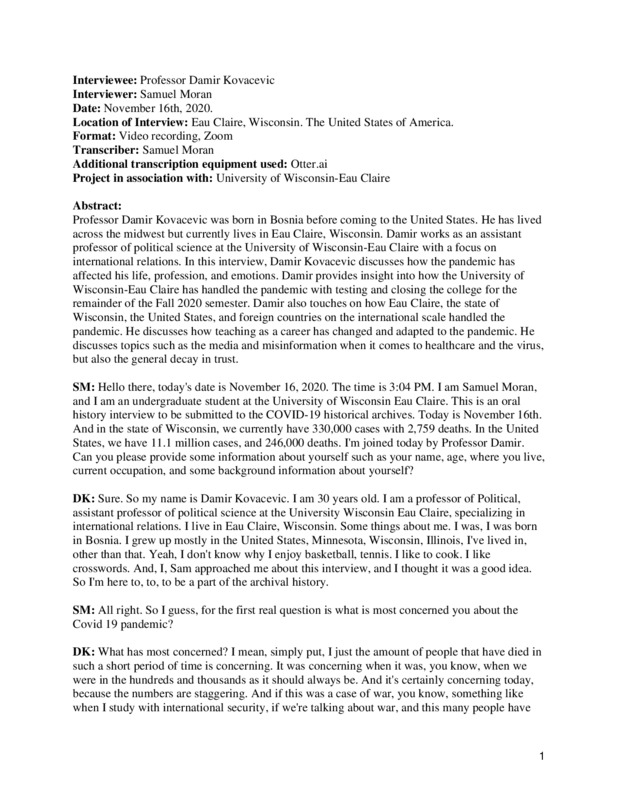 12/11/2020
12/11/2020Damir Kovacevic Oral History, 2020/11/16
Professor Damir Kovacevic was born in Bosnia before coming to the United States. He has lived across the midwest but currently lives in Eau Claire, Wisconsin. Damir works as an assistant professor of political science at the University of Wisconsin-Eau Claire with a focus on international relations. In this interview, Damir Kovacevic discusses how the pandemic has affected his life, profession, and emotions. Damir provides insight into how the University of Wisconsin-Eau Claire has handled the pandemic with testing and closing the college for the remainder of the Fall 2020 semester. Damir also touches on how Eau Claire, the state of Wisconsin, the United States, and foreign countries on the international scale handled the pandemic. He discusses how teaching as a career has changed and adapted to the pandemic. He discusses topics such as the media and misinformation when it comes to healthcare and the virus, but also the general decay in trust. -
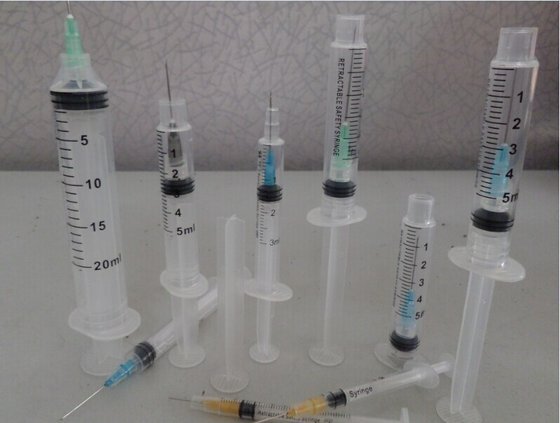 2021-11-26
2021-11-26Safety syringes (different sizes) adults and children
The attached photo is of retractable safety syringes (different sizes) adults and children -
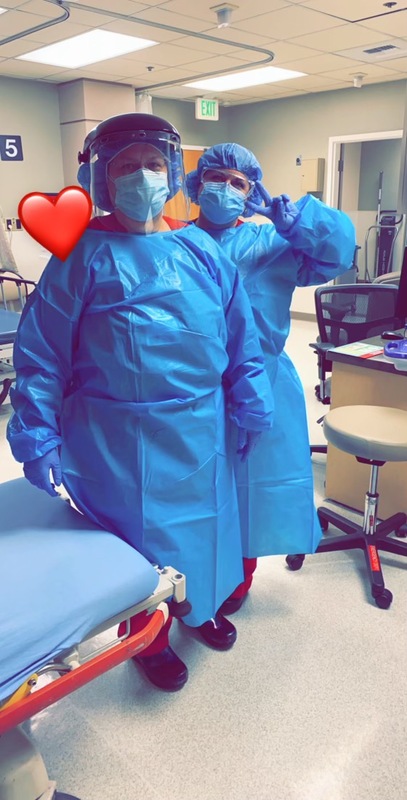 2020
2020My Mom Working in the COVID ICU
While this is not me, it is still important to me since it is my mom. She has worked in the COVID ICU almost the entire time, and I was really affected by seeing her gowned up like that the first time. Her career during my lifetime has not required so much PPE, so it was a really surreal moment that forced me to really appreciate the extremity of the pandemic and how much danger my mom was in. -
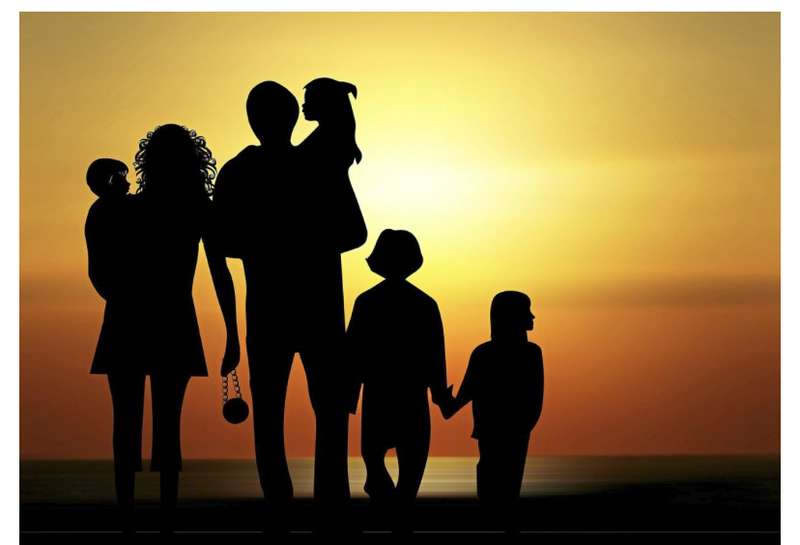 2021-10-05
2021-10-05Pandemic 2020
The pandemic affected many of our day to day lives. To start off it isolated us from socializing with friends, family, coworkers and others. It restricted us from doing our normal daily activities and routines. It made us miss important events and milestones that we can’t take back. For me the pandemic was very difficult, although the pandemic has not ended, the start of the pandemic was the biggest hardship. To start off, I had just started a new job that required me to help others get through the pandemic. I was assisting about 12 dr offices in scheduling patients. This was overwhelming to say the least and caused stress and anxiety. Many of us were facing challenges that can be stressful, overwhelming, and cause strong emotions in adults and children. Public health actions, such as social distancing, were necessary to reduce the spread of COVID-19, but that could make us feel isolated and lonely and could increase stress and anxiety. I know for me it was very hard not to be around my family. I’m very close with my family and not being able to see them and hang out with them definitely took a toll on me. For starters I was not able to be in the delivery room with my sister who was pregnant at the time and I was not able to meet my niece in person for months. The first time I met her was through FaceTime, which was not the same as being able to hold my first niece. Adults struggled adapting to new social routines—from choosing to skip in person gatherings, to consistently wearing masks in public. Daily activities that one would normally do were taken. For me my daily activity was the gym and with the pandemic it caused a shut down and once it reopened it was difficult to adjust to the new “normal”. -
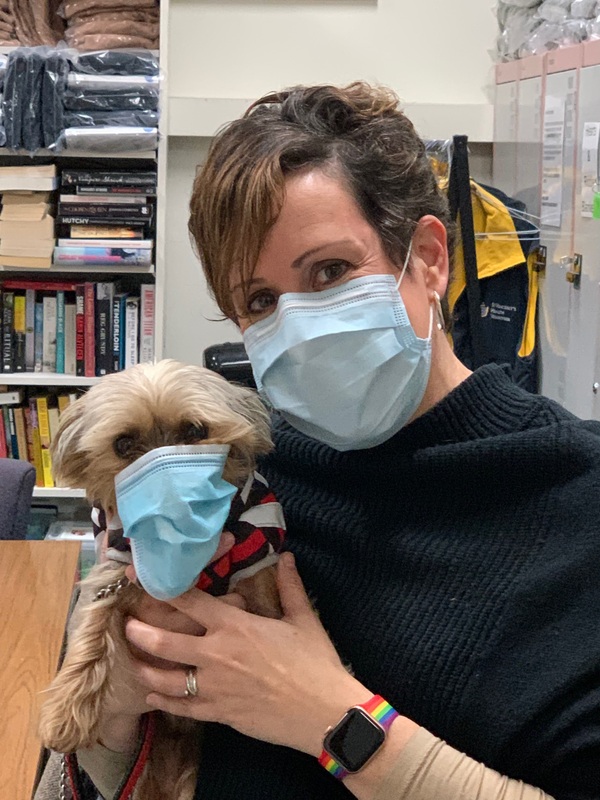 2021-09-29
2021-09-29St Vincent's Hospital Melbourne masked up therapy dog Macca with hospital Volunteer Services Coordinator
Therapy dog Macca lifts the spirits of all whom he encounters and he has proven to be a greater stress reliever for staff working longer and harder due to the pandemic. The true magic of Macca’s contribution has been visible at the bedside. There have been patients who have spoken their first words after surgery while holding Macca and others who have been unable to use their arms who suddenly move to pat him. In recognition of his work he was crowned "Top dog with a job" from a field of 500 in the inaugural "Oz Top Dog Award" in September 2021. This was welcome good news in a difficult week where there was a surge of cases in Victoria's third wave. Macca's story attracted diverse media coverage including features in "The Herald Sun", ABC Radio 774 Melbourne and Channel 10 News. -
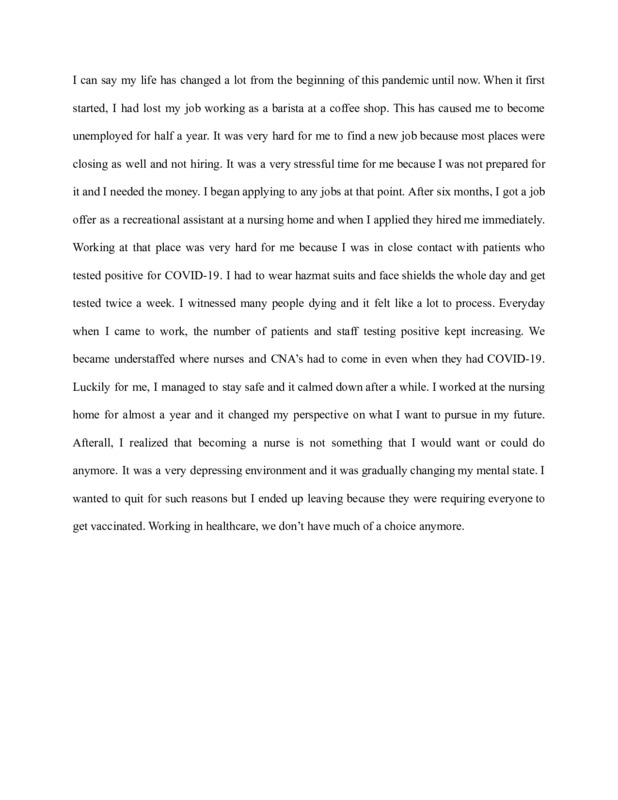 2021-01-01
2021-01-01A Brief Timeline
This brief timeline describes my experience during this pandemic. I decided to share my perspective because I am sure most people can relate. -
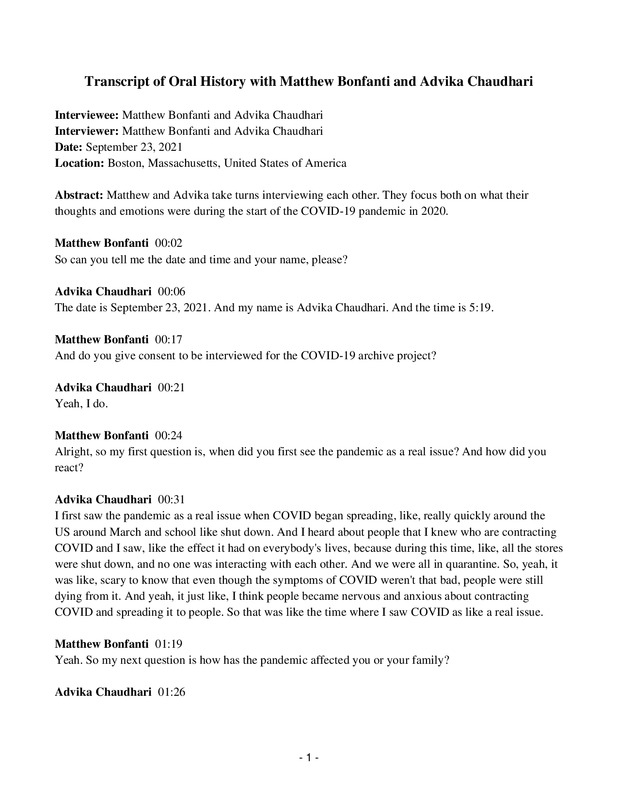 2021-09-23
2021-09-23Advika Chaudhari and Matthew Bonfanti Oral History, 2021/09/23
This is important because it provides the experience of students who had to adapt to several changes during the pandemic who may have had different experiences. -
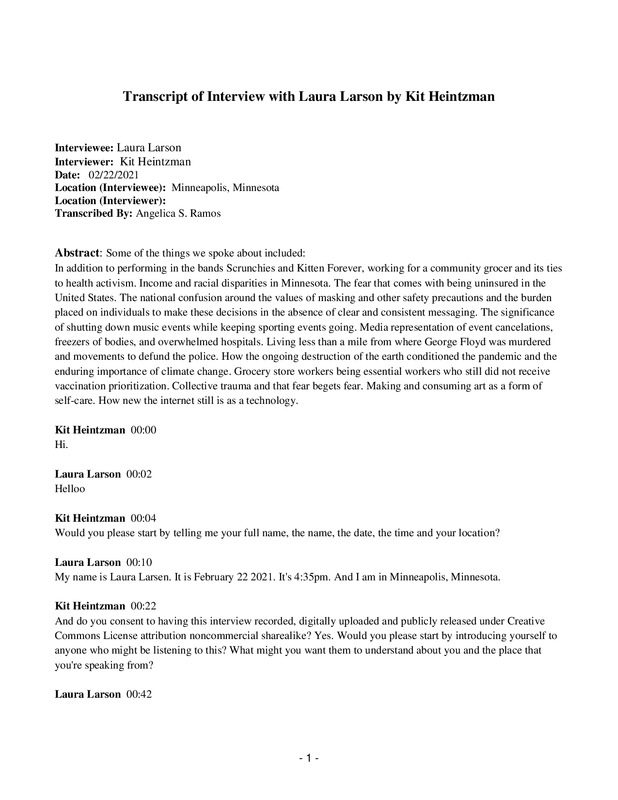 2021-02-21
2021-02-21Laura Larson Oral History, 2021/02/21
Self description: “My name is Laura, and I am in two bands right now. I am in a band called Scrunchies and a band called Kitten Forever. I play guitar, base, drums, and I sing in those two bands. I live in Minneapolis, Minnesota. For work, I work at a community cooperative grocery store, in an administrative position, but one that is community outreach based and have a lot to do with meeting and coordinating with our community partners, a lot of the work that I do is about mutual aid, and helping out the community with the resources that we have available to us. Besides that I am a visual artist, I like to paint, I like to draw, I like to read books, and I live in a little duplex with my partner and our cat Sissy.” Some of the things we spoke about included: - In addition to performing in the bands Scrunchies and Kitten Forever, working for a community grocer and its ties to health activism. - Income and racial disparities in Minnesota. - The fear that comes with being uninsured in the United States. - The national confusion around the values of masking and other safety precautions and the burden placed on individuals to make these decisions in the absence of clear and consistent messaging. - The significance of shutting down music events while keeping sporting events going. - Media representation of event cancelations, freezers of bodies, and overwhelmed hospitals. - Living less than a mile from where George Floyd was murdered and movements to defund the police. - How the ongoing destruction of the earth conditioned the pandemic and the enduring importance of climate change. - Grocery store workers being essential workers who still did not receive vaccination prioritization. - Collective trauma and that fear begets fear. - Making and consuming art as a form of self-care. - How new the internet still is as a technology. Cultural references: Save Our Stages, The Atlantic article “Cancel Everything”. See also: https://scrunchies.bandcamp.com/ https://kittenforever.bandcamp.com -
 2020-04-28
2020-04-28"Coronavirus at Holyoke Soldiers' Home: 2 more veterans die in worst outbreak at health care facility nationwide
This article, published by MassLive, reports on the rising death count among residents at the Holyoke Soldiers' Home in Holyoke, Massachusetts. Nearly three-quarters of the residents had contracted COVID-19, and about one-third had died from it. The title is evocative of the scale of the tragedy. -
2021-08-09
THE19: Howl of a Mad (American) COVID-dodger, a Dia-Rant
A year from the perspective of an immuno-compromised, mulitple comorbidities survivor stranded in place until vaccine in a poor, rural, underserved and politically conservative Colorado ski and summer resort community over run by affluent COVID torurism. -
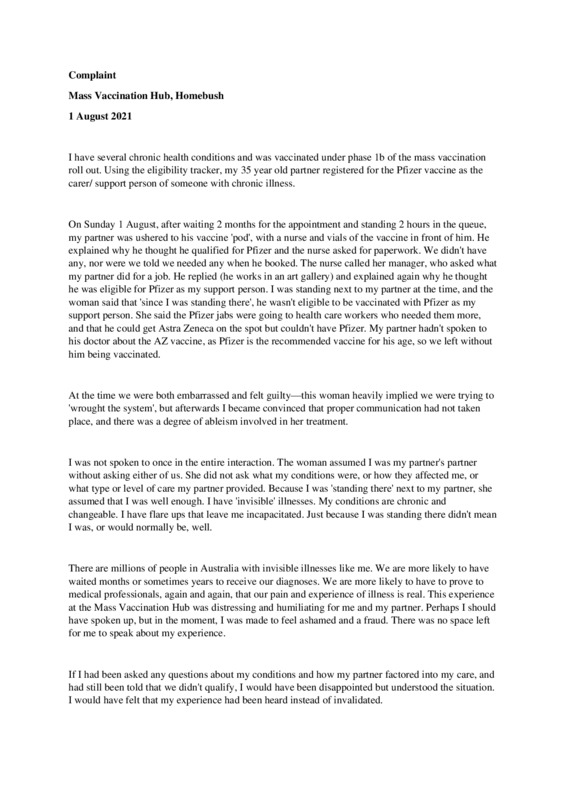 2021-08-01
2021-08-01Ableism and Vaccination
This is a complaint that I don't know whether to officially lodge about the treatment my partner and I experienced at the mass vaccination hub in Homebush. It is a complaint regarding ableism, and invisible illness. -
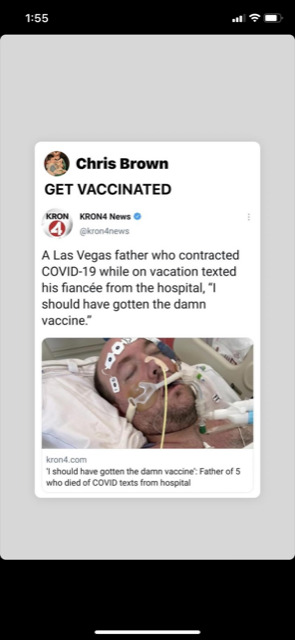 2021-08-01
2021-08-01Get Vaccinated
"A Las Vegas father who contracted COVID-19 while on vacation texted his finance from the hospital, "I should have gotten the damn vaccine" This sad story came across my social media feed, I took a screenshot and then found an article which I attached to this item for the full story. -
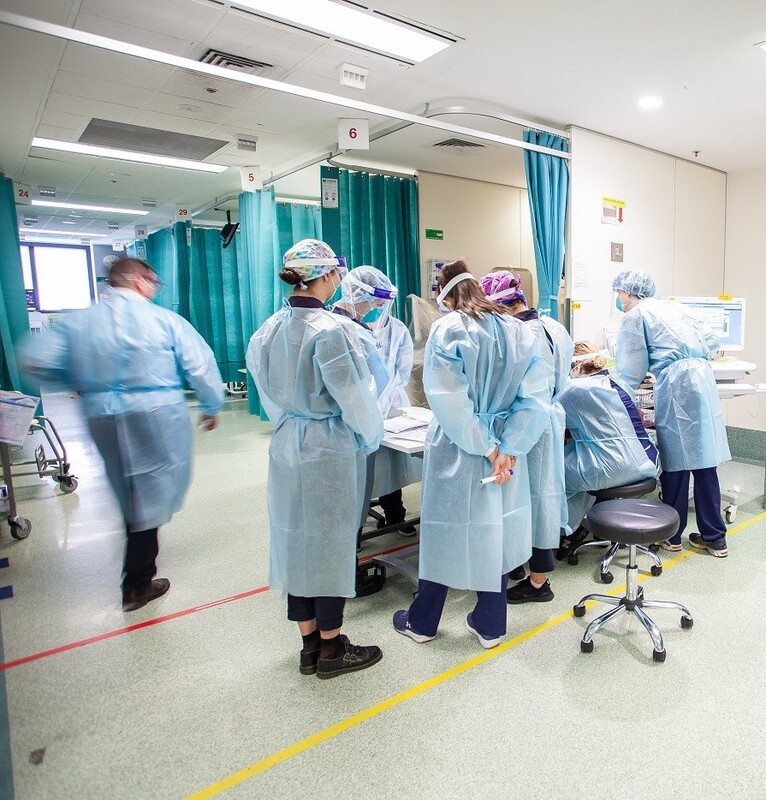 2020-08-11
2020-08-11Nurse handover Emergency Department, St Vincent's Hospital Melbourne
This photograph was taken in August 2020, the time when daily and active cases in Victoria's second wave were at their peak with hospitals adapting services and protocols in response. The photograph shows a nurse handover in the hospital's Emergency Department. The red line on the floor marks the boundary of the "hot zone" area dedicated to the care of patients regarded as infectious. Staff wear prescribed Level 4 PPE (Personal Protective Equipment) of gowns, face protection and N95 masks. -
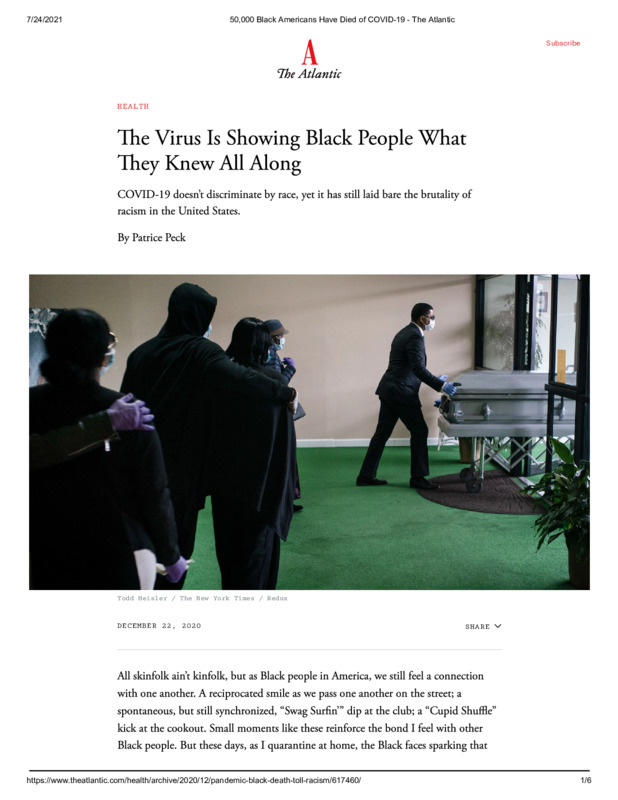 2020-12-22
2020-12-22The Virus Is Showing Black People What They Knew All Along
In this article, author Patrice Peck discusses how black Americans are dying of COVID-19 at 1.7 times the rate of whites. In her words "19,000 Black people would still be alive if not for systemic racism." -
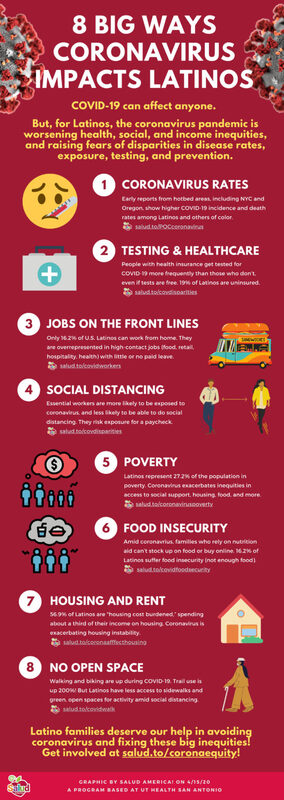 2020-04-16
2020-04-16Infographic: 8 Big Ways Coronavirus Impacts Latinos
This infographic and the accompanying articles discuss the disproportionate impact that coronavirus has on Latino communities. -
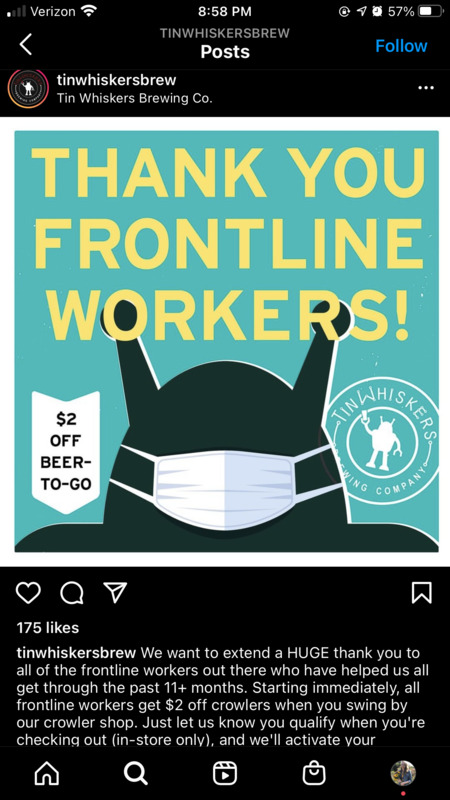 2021-02-03
2021-02-03Tin Whiskers Brew Offered Frontline Workers Discount on Beer
To thank those risking their health for the benefit of others, Tin Whiskers Brewing Co. in Saint Paul, Minnesota showed their appreciation by offering a discount on take-out beer to frontline workers. They included health care workers, educators, first responders, service industry workers, postal workers, and public transit workers in their list, and were open to suggestions to add to that list. While a discount on beer doesn't make up for all the work these individuals do, it is a nice gesture to show appreciation during this challenging time. Given that those working in this brewery are also service industry workers, they recognize the risks and difficulties that frontline workers have been experiencing, and wanted to make it clear how much these people do for society. Instagram caption: @tinwhiskersbrew We want to extend a HUGE thank you to all of the frontline workers out there who have helped us all get through the past 11+ months. Starting immediately, all frontline workers get $2 off crowlers when you swing by our crowler shop. Just let us know you qualify when you're checking out (in-store only), and we'll activate your discount. What constitutes a frontline worker? --Health Care Workers --Educators --First Responders --Grocery/Retail/Pharmacy/Liquor Store Employees --Bar/Brewery/Restaurant Service Industry --Postal Service/Delivery --Public Transit Workers If we missed a field, let us know! We definitely want to thank you too. -
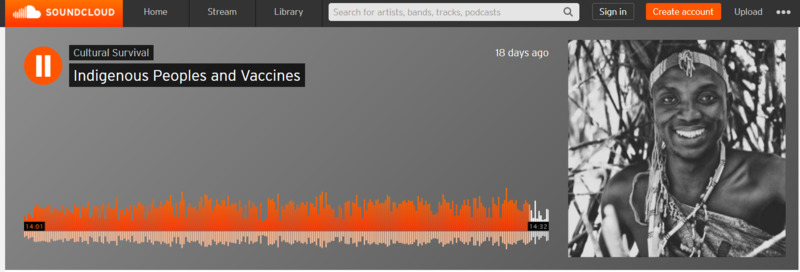 2021-04-07
2021-04-07Indigenous Peoples and Vaccines
“The coronavirus (COVID-19) pandemic poses a grave health threat to Indigenous peoples around the world. Indigenous communities already experience poor access to healthcare, significantly higher rates of communicable and non-communicable diseases, lack of access to essential services, sanitation, and other key preventive measures, such as clean water, soap, disinfectant, etc.” -
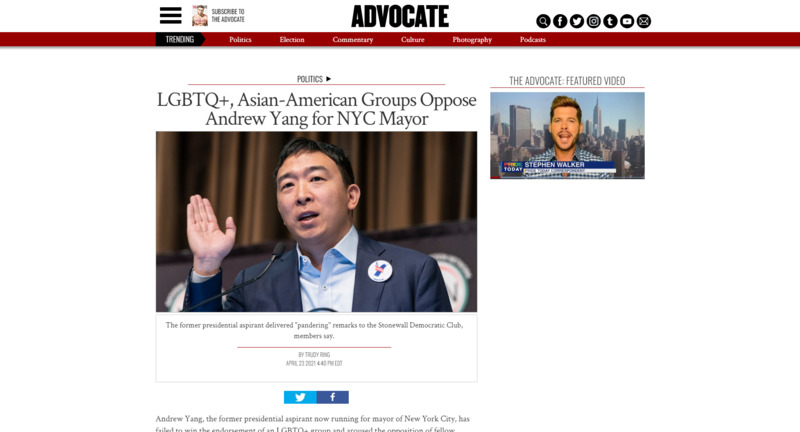 2021-04-23
2021-04-23Yang Not Getting LGBTQ Support for NYC Mayor
People in the LGBTQ community feel that the former Democratic Presential nominee is not out for their best interest but instead is just using them for their vote. They feel like he should push more for homelessness, housing, healthcare, and other issues important to the LGBTQ people but Mr. Yang says he loves and supports the community. He is running for New York City mayor and is the former nominee of the democratic party. -
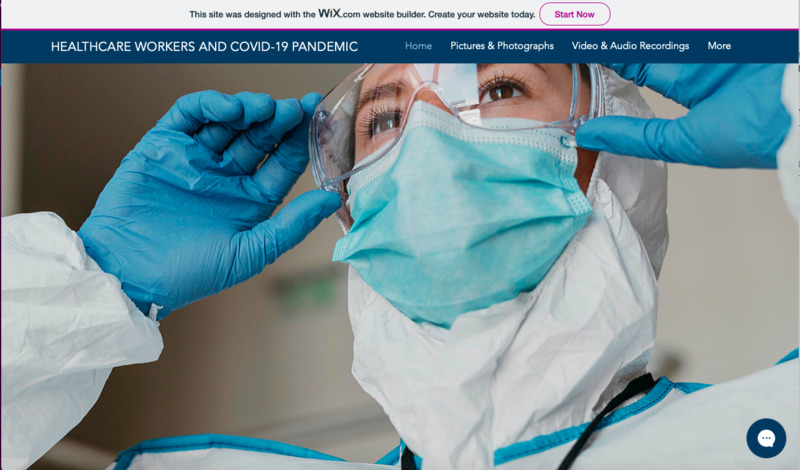 2021-03-29
2021-03-29Healthcare Workers and the COVID-19 Pandemic
The website designed was chosen to focus on the topic of healthcare workers and their role during the ongoing COVID-19 pandemic. It showcases multiple elements of media from pictures, videos, social media posts and other engagements that compile information and stories about frontline healthcare workers that are putting their lives on the line to save people. It is necessary that the general population has an understanding of what our healthcare workers are going through during such an unprecedented time. It was important for me to show this side of healthcare workers because they are the heroes amongst our society, and we all talk about fictional heroes or figures and whatnot, but we need to appreciate those that are fighting and sacrificing themselves, for the betterment of our health. This archive project was for university course that I took this semester, and it required extensive research, but additional to that I also had the opportunity to reach out to healthcare workers and get their stories, combined with the many stories that are shared online by them, and compiled, they have helped in constructing this body of a work which I was fortunate enough to create. A large gratitude to them because without our healthcare workers, there would be no health in our societies. -
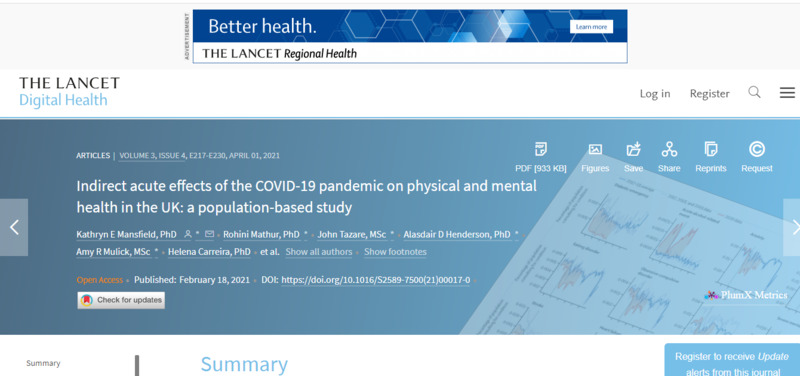 2021-04-11
2021-04-11Indirect acute effects on physical and mental health
This academic article is in the Lancet, a medical journal. I chose this because it is public, unlike some academic articles, and it is, as of right now, a pretty unique research article. Although it is done in the UK, it reviewed medical records, both physical and mental, from 2017 to 2020. The changes are a little surprising, as the largest reductions in health care at the start of the restrictions were diabetic emergencies, depression, and self-harm. This is something I have seen a lot in my research into the unintended consequences of the COVID-19 pandemic. Mental illness is the last thing to be cared for in a pandemic, or even in other natural disasters. The consequences on human health from this pandemic are only just now coming to light. This journal entry covers in-depth research and I highly suggest it. -
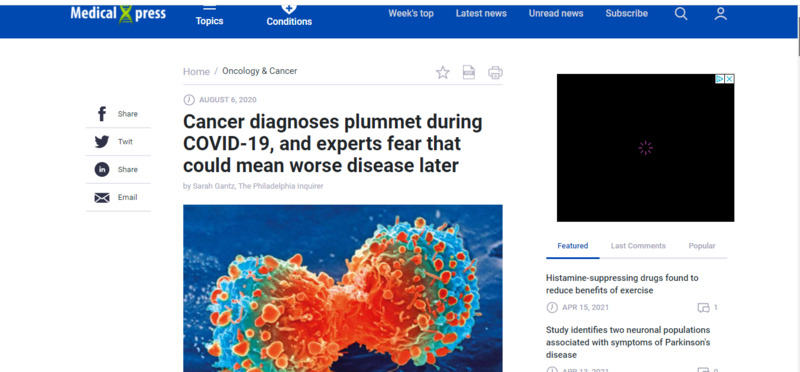 2021-04-11
2021-04-11Cancer diagnosis rates go down!
I know I have presented a pretty eye catching and exciting title, but the fact of the matter is, they aren't going down. The amount of people who have cancer has not plummeted, as the title suggests. Rather, the statistics have gone down. As the article states, "new findings offer grim evidence of the consequences of delayed care: A rise in undetected cancers that, when eventually diagnosed, may be more advanced and difficult to treat." I think this is a great reminder that statistics are not the people they represent, and many things effect the numbers. This is relevant to my research on the unintended consequences of the COVID-19 pandemic. -
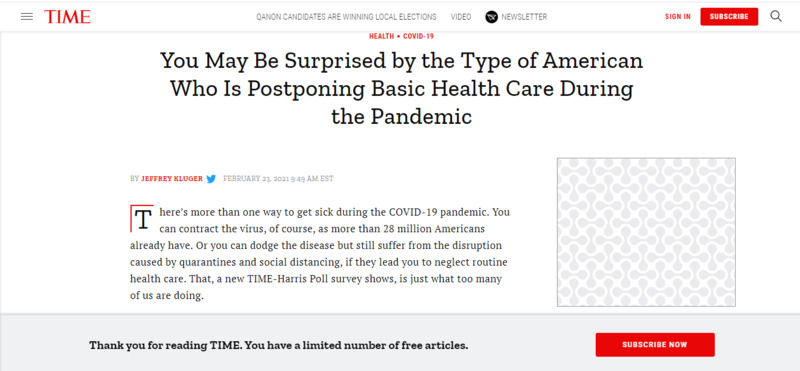 2021-04-11
2021-04-11Postponing Basic Health Care During the Pandemic
I have been researching the unintended consequences of the COVID-19 pandemic. One consequence that interests me the most is people missing important specialist appointments for things like heart disease or cancer. I would have assumed that it would be the lower class skipping these appointments the most due to the fact that is many cases it is already harder for lower class people to get to regular appointments. But this article proves my thought wrong, and states that the lower and middle class people have less opportunity to miss these appointments. They tend to have more healthcare problems, according to the article, and therefore need the appointments more. In addition, the numbers might reflect the fact that lower income people don't go to the doctor as much as higher income people in general, therefore the numbers were low to begin with. The article is a very interesting read and I highly suggest it. -
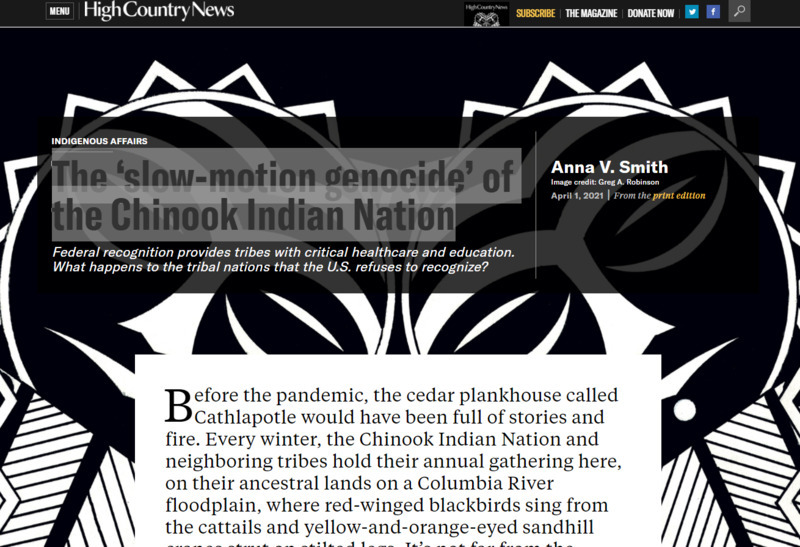 2021-04-01
2021-04-01The ‘slow-motion’ genocide’ of the Chinook Indian Nation
The pandemic has exacerbated the Chinook’s lack of the kind of social safety net recognized tribes possess. While the COVID-19 mortality rate of Indigenous people is almost 2.5 times that of white people, unrecognized tribes have not received any of the $8 billion in government aid passed by Congress last spring. Nor have they received priority for tests or vaccines. Instead, they have to rely on neighboring tribes like the Grand Ronde and the Shoalwater Bay Tribe to vaccinate their elder knowledge-keepers. Chinook tribal members sometimes refer to the lack of recognition as slow-motion genocide. “Explain how it’s not genocide,” Johnson said to me. “Someone explain to me how it’s not.” -
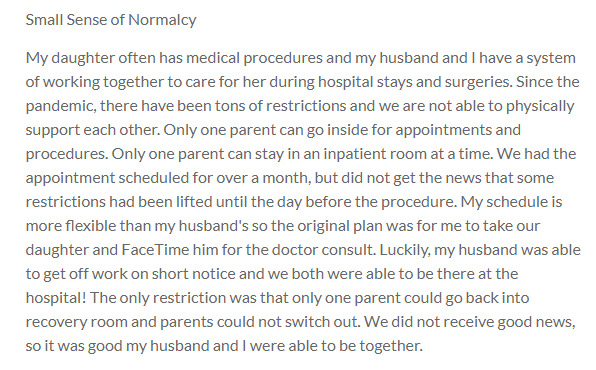 2021-04-09
2021-04-09Small Sense of Normalcy
My daughter often has medical procedures and my husband and I have a system of working together to care for her during hospital stays and surgeries. Since the pandemic, there have been tons of restrictions and we are not able to physically support each other. Only one parent can go inside for appointments and procedures. Only one parent can stay in an inpatient room at a time. We had the appointment scheduled for over a month, but did not get the news that some restrictions had been lifted until the day before the procedure. My schedule is more flexible than my husband's so the original plan was for me to take our daughter and FaceTime him for the doctor consult. Luckily, my husband was able to get off work on short notice and we both were able to be there at the hospital! The only restriction was that only one parent could go back into recovery room and parents could not switch out. We did not receive good news, so it was good my husband and I were able to be together. -
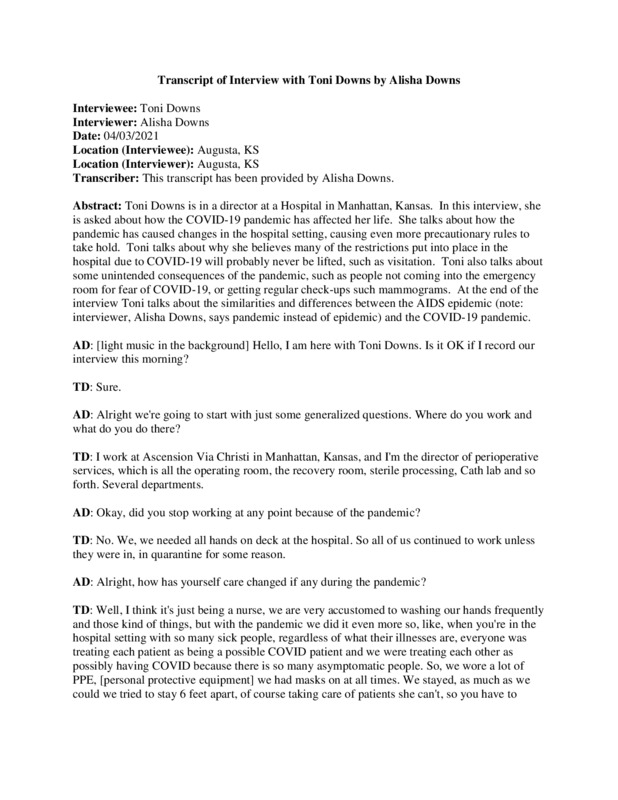 2021-04-03
2021-04-03Oral Interview with Toni Downs
Toni Downs is in a lead position at a hospital in Kansas. In this interview, Toni tells me about changes that have occurred at the hospital as a result of the COVID-19 pandemic. She also discusses the long term changes she suspects will stay in effect, such as visitation regulations to the hospital. Toni tells me about similarities and differences between this pandemic and the start of the AIDS pandemic. She also discusses how the number of people going to the emergency room have dropped significantly, more than 75% at the start of the pandemic. Toni believes if we all work together at stopping the spread, we will get this under control. However, she thinks many things may stay around for a while in the hospital setting, such as the before mentioned visitation rules, and even mask wearing, in order to protect hospital staff and the patients. I am researching the unexpected consequences of the COVID-19 pandemic, such as people skipping mammograms for fear of catching COVID at the doctors office. I chose to interview Toni for my research, due to her insider knowledge of the inner workings of a hospital. -
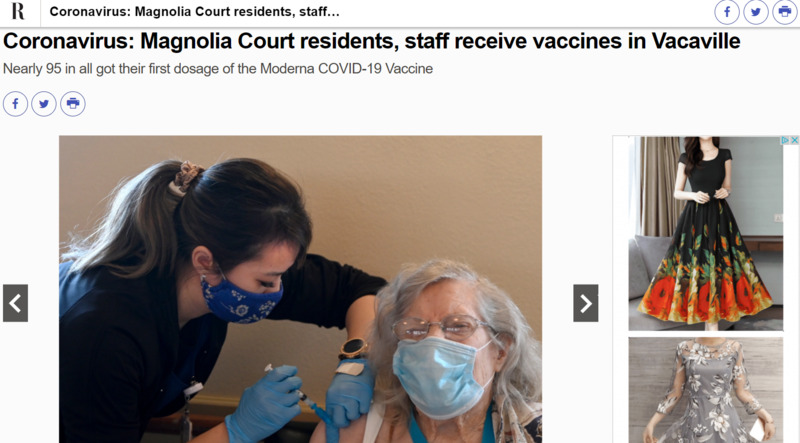 2021-01-15
2021-01-15My Grandma Made Front Page Again
My grandma Pauline Bell made the front page of our local paper again. This time, she was one of the first in the area to receive the vaccine. We were all so happy for her and what this might mean for all of us who miss her. -
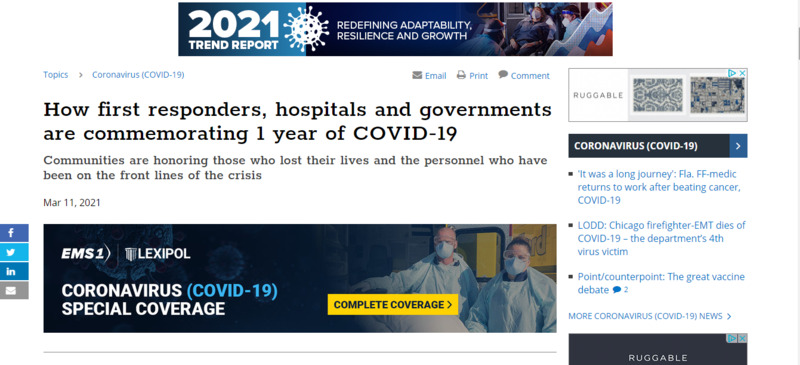 2021-03-11
2021-03-11Healthcare providers honor Covid-19's One Year Anniversary
This article is about the one-year anniversary of Covid-19 and how healthcare providers are celebrating and honoring the occasion. Healthcare workers and EMS providers have spent the past year on the front-lines of the Covid response. They have sacrificed much and have seen unprecedented horrors during this pandemic. This article features several social media posts from various healthcare agencies. In all of these posts, they acknowledge the patients and providers that we have lost in the past year, but also celebrate the efforts of the providers in trying to help the public during this pandemic. -
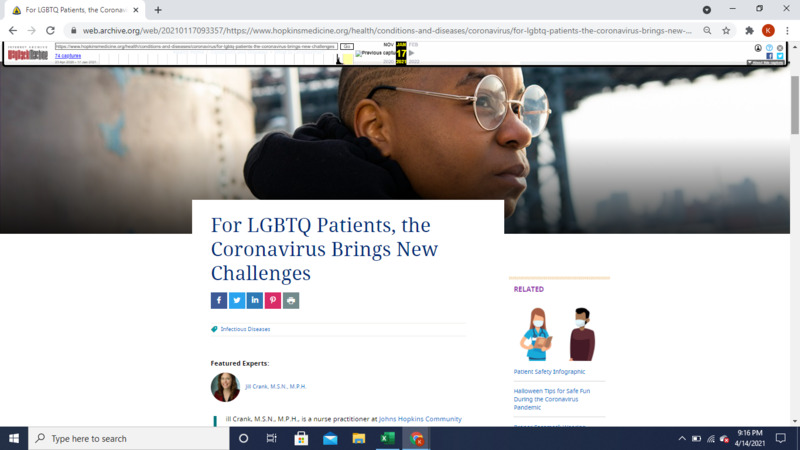 2020-06-20
2020-06-20For LGBTQ Patients, the Coronavirus Brings New Challenges
This article by John Hopkins Medicine is talking about how the COVID-19 pandemic has impacted the LGBTQ+ community. The doctor points out that community members are more likely to be smokers and so they are higher proportionately to have complications with COVID-19. The doctor also points out that gender-affirming surgery in the Transgender community has been delayed or is not being done at all which has impacted that community greatly. It is important that the doctor gives the advice to not isolate ourselves in the LGBTQ+ community throughout the pandemic. -
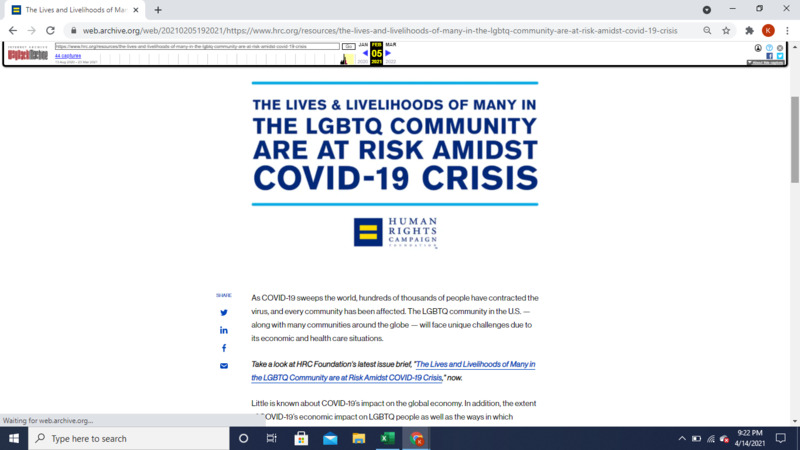 2021
2021The Lives and Livelihoods of Many in the LGBTQ Community are at Risk Amidst COVID-19 Crisis
The story speaks about how many people in the LGBTQ community are at risk while the COVID-19 crisis is occurring. The study shows that people within the community have less access to healthcare, a greater risk of health complications due to COVID-19, and do not have paid leave. -
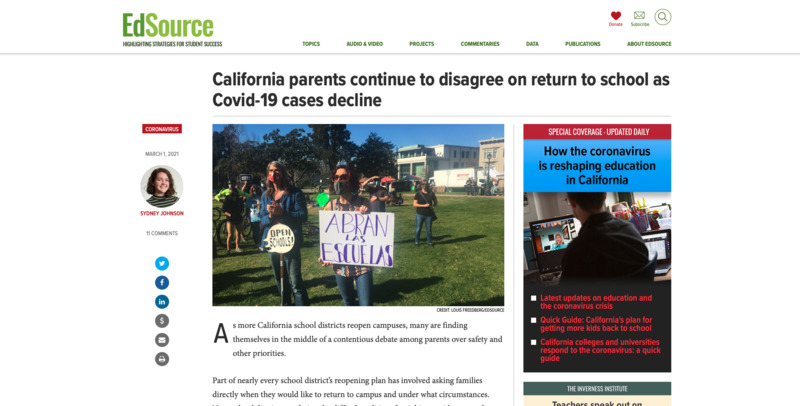 2021-03-01
2021-03-01California Parents' Opinions on Schools Reopening
This provides a general impression of California's parents' thoughts towards reopening in-person schools. Surveys selected from the country-wide populace as well as California district-wide populations were considered. They don't only provide demographics. They also provide some context and reasons for why the participants felt a certain way. One of those responses was "Yes (only if the vaccine is readily available)", another being "No (prefer distance learning)" by an overwhelming amount. It helps inform us of the public opinion while vaccines were still in its early rollout stages. -
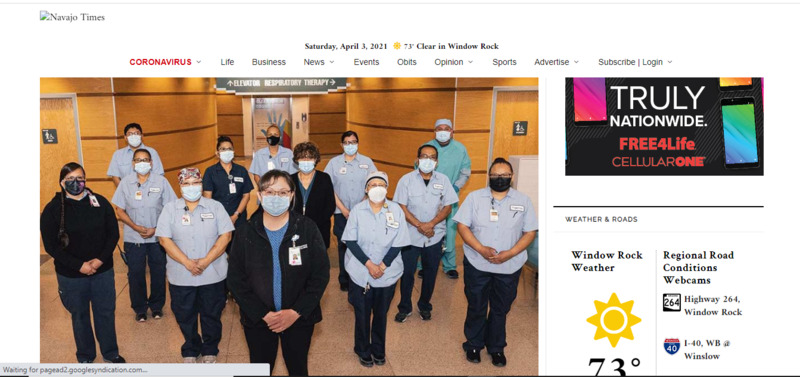 2021-03-26
2021-03-26‘They became warriors’: Reflections from the front lines as Tséhootsooí Medical Center workers share experiences
By Rima Krisst | Mar 26, 2021 | CORONAVIRUS, People | Tséhootsooí Medical Center workers share experiences Wilberta “Billy” Jackson, public health nurse III This pandemic has been the longest roller coaster of stress, grief, and loss. I’ve kept my routine simple – sleep, eat, and exercise. And, more sleep. This has been and will probably be the most challenging time of our lives. I could focus on all the bad, but so much good has come from this, from community members stepping up, leaders rolling their sleeves up and getting dirty, how we came together to care for our elders, and so much more. Professionally, we’ve adjusted and readjusted a million times over and completely changed how we deliver health care. We’ve had information, guidance, and policies being added or changing every day and we still were able to deliver health care in a safe, efficient manner. At the beginning of the pandemic, our leaders were warning everyone about the health care system being overwhelmed. Most people thought about it in terms of hospitals running out of beds, but they didn’t think of it in terms of how an underfunded and shorthanded public health force would respond to a pandemic in a rural area with limited resources, and where a population’s most basic physiological and safety needs are not being met. When you don’t have access to clean water, food, shelter and security, you’re not able to prioritize prevention measures until your basic human needs are addressed. The resiliency of the Diné people is unrivaled. The days I’m struggling or feel like giving up, I hear my grandmother’s words, and that’s what keeps me going. And my mother’s surprise delivery of Navajo soul food meals. I’m a public health nurse, so it won’t come as a surprise that I’m excited about the COVID vaccines. We’ve already seen a substantial decline in cases, hospitalizations, and deaths, so we know it’s working. My hope is that our response to the next pandemic or health care crisis won’t be complicated by politics, lack of national strategy, lack of preparation, and misinformation. Stacey Burnside, Primary Care registered nurse What I have learned from this pandemic is to cherish every day and every person that you love. COVID-19 has impacted my family and me profoundly. I lost an uncle and an aunt to COVID-19, and to this day, it is surreal that they are gone. As a primary care nurse, it is difficult to hear about losing a patient to COVID-19, and at the peak, it was almost a daily occurrence… The challenges that I faced during this pandemic were adapting to the changes in work roles and being separated from the people I love. The clinic that I worked in was closed when the pandemic hit the first peak, and I, along with my coworkers, was informed that we had to work in the Emergency Room. The moment that I saw a patient who needed me to be their nurse, despite having COVID-19, humbled me. That moment in the ER humanized COVID-19 for me and made me realize that I was put there for a reason. No matter what the situation is, nurses adapt, and the teamwork and strength we draw upon each other are phenomenal. A huge hit to me personally and professionally was losing a friend to suicide … dealing with grief, loss, and stress has been a daily thing. What has helped me is drawing strength from my God, husband and son, and family. There are many negatives to the pandemic, but one positive that many have seen is the love and strength we have found among our families. I am thrilled that we are at a point of a high vaccination rate in the Navajo Nation. I remember when I administered my first COVID-19 vaccine to a patient, it brought tears to my eyes, and I cried after work. Leah Chattin, respiratory therapist I’ve been a respiratory therapist since 2003. What I experienced throughout the first surge of COVID-19 here on Dinetah is not what you prepare for. I see the impact on my life as deep internal scars that I buried and to resurface those experiences is a nightmare. Imagine the inability to fully take a deep breath, something so simple we take for granted. Supporting my patients with breathing treatments, providing chest physical therapy, changing breathing devices constantly because the demand for oxygen escalates all in a 12-hour or more shift. All these specialized techniques to avoid the last option of intubation, allowing an artificial airway introduced to your trachea with an opening at the tip to provide mechanical breaths from a mechanical ventilator. Fear expressed from my patients was a frequent emotion. You are alone, isolated from your family, your loved ones, no familiar face to embrace, to celebrate your improvement or the worst, a decline despite the battle you have endured. I’d remind my patients not to give up… Instinct took over because I’m a mother too, a nurturer. I can remember softly stroking their hair, holding their hands, shedding tears, praying, putting myself in that empty place at bedside where your family should be gathered, processing the grief. Accepting loss was tremendously difficult. I lost myself because I did not decompress my emotions. My spirit slivered away slowly each time my patients faced rejection of our efforts to sustain life. How I endured and sustained my sanity was prayer requests. Prayer was undoubtedly my saving grace. This virus is fluidic, the path it took was unpredictable. I strongly believe we need to continue wearing a mask, following the CDC guidelines and begin or sustain our health and wellness. Putting into words my experience was not an easy effort, however it’s a pathway for healing. Every COVID patient I battled for will forever have a place in my heart. Sandra Fouser, nurse executive of the Primary Care and Specialty Clinics Seeing the virus cross the ocean and hit the heart of the Navajo Reservation forever changed our lives. As a health professional, I knew venturing into the unknown with limited protection meant some would survive and some wouldn’t. What I have learned working on the front lines – compassion, cohesiveness, companionship, strength, sadness and mental stress. We have been battered, beaten, praised, comforted and have also received recognition from all walks of life. I am proud to be a nurse. I believe the strength to endure comes from resiliency and the people we work with and the support of our families at home. As nurses, we cannot stand still. I feel it is in our blood to help and move forward. I have lost friends, coworkers, relatives and patients. The grief I feel is palpable, almost more than I can handle. Seeing my family, staff and patients suffer through illness and grief has been very challenging and heartbreaking. As a team, I believe when something happens to one of us, we all feel the effects, we grow closer and find comfort in each other. I see the vaccine as a progression toward eradicating the detrimental effects of this virus and giving us hope that there is a better tomorrow and that Hózhó will be restored. Dr. Karen Williams, hospitalist physician I am a Native physician (Mountain Maidu/Apache) and Indian Health Service Professional Scholar. When the pandemic started our hospitals were suddenly overwhelmed with large numbers of very ill patients needing oxygen. Some patients who worsened were placed on a “life support” or ventilators since they could no longer breathe on their own. Despite our best medical management efforts, including use of high-flow oxygen, there were patients who did not survive. I witnessed more death in a year than I have ever experienced in my career. This was traumatic for me because every day I came to work I felt like I was coming into a war zone. We saw people struggling to breathe and fighting for their life. We heard family members saying their goodbyes to their loved ones and crying over the phone. We held hands of those who took their last breath and witnessed co-workers not able to control their tears. If it were not for our team efforts, almost a military-style mentality, we could not have managed. As a hospitalist physician, the biggest challenge was ensuring that I had the most up-to-date medical knowledge to save a patient’s life. During the beginning of the pandemic many doctors throughout the country did not feel prepared. This was quickly overcome by learning medical strategies used by doctors throughout the world. The treatments used included steroids, anticoagulant medications, and high-flow oxygen. We had the support of our hospital’s incident command leadership and adapted to the changes. This included being able to offer our patients who needed oxygen a federal Drug Administration-approved “emergency use” medication called Remdesivir, and more recently Bamlavinimab for non-hospitalized patients My experiences on the front lines were psychologically and physically overwhelming … I sought support from elders and used my Native spirituality for strength. I also sought protection support from traditional Indian practitioners who set up a tipi and hogan outside the hospital for employees. I sometimes thought twice about the danger I was in. However, I acknowledged that I would never walk away. This is a result of my obligation to the Native community and the hundreds of patients I had gotten to know for so long. I “warriored up” in my mind and sought to do the best I could. I do not foresee an end to mask wearing, and now recognize how careful we all must be to protect each other. I saw too many elders get severely ill and even pass away from COVID as a result of young family members not being careful and bringing it home. I have encouraged community members and my own family to get the vaccine as soon as possible. I received two doses of the Pfizer vaccine and said a prayer in my Native way each time for protection. Natasha Topaha, certified medical assistant, Mobile Unit Overall, this year has been extremely challenging, but also has reinforced my personal strength and resiliency. I have had ongoing concerns throughout the epidemic regarding my kids’ isolation and their mental health. It has been difficult, but doable, to manage both working in health care and supporting my family both emotionally and physically. I had constant worry about bringing the virus home and infecting my family given that I was working in high risk areas and providing COVID testing, vaccines and social and mental health support to patients. I found that doing outdoor activities with my family, such as bike riding and hiking, helped me ease my stress and helped teach my children some healthy coping skills. And we could spend time together! I feel very happy and grateful in both receiving the vaccine and being able to provide it to patients and the community. I feel safer at work and at home now. Johnny Willeto Jr., facility manager/logistics chief The strength to endure comes from within yourself. For me this began in my childhood as the son of Delphine Damon Willeto and Johnny Willeto Sr., who nurtured me to become a great human being. They taught me to be a courageous, productive worker and know my limitations. As a facilities manager, my main focus and responsibilities are the protection in the physical environment of all who walk through the doors of Fort Defiance Indian Health Board’s facilities. All we knew is that COVID-19 was airborne and surface communicated. I treated it as you would tuberculosis and ensured that my staff had adequate PPE to help protect them when they are tasked with working in the patient care areas. This responsibility was a big challenge when trying to procure medical equipment such as masks, gloves, safety glasses, gowns, scrubs, and so forth. Having an MBA has allowed me to flourish in this high stress environment and to adjust with adaptations to finding supplies and creating new relationships with trustworthy suppliers. Being in close proximity to patients who are struggling with getting well can be heart wrenching. Being able to fulfill my duties in the support role to the best of my ability for my community and teammates has allowed me to sleep well at night knowing that I gave it my all. I have lost a brother-in-law who contracted the virus in the Scottsdale area of Arizona. These were very difficult times because as Navajos we are accustomed to comforting each other by a hug or handshake. With COVID, gatherings are not safe, so having family meetings for planning the funeral is off and also the funeral usually consists of 10 minutes before the burial with only a few close family in attendance. One of the biggest assets I have gained is the spiritual belief in God and keeping the communication open by saying my prayers often – to be thankful for the blessings that have come my way or when asking for strength to endure the hardships. In my free time I isolate on the Willeto Sheep Ranch in Goatsprings Valley, Arizona, where I tend 120 sheep and goats. Being able to separate the everyday stress and recharge is paramount to going forward with courage and mental sharpness to make the right choices for the organization, patients and employees. The vaccines are an effective tool to help reduce the mortality of the virus on us and give us protection to this invisible enemy. Corinne Legah, Environmental Service supervisor Personally, I was scared when I first heard of the spread of the virus overseas. It was shocking how fast the virus traveled. In the beginning our team was needed to help keep the hospital sanitized and safe for patients. We reinforced training on the cleaning process for the airborne/droplet virus. I constantly stressed wearing PPE and hand washing. I am so proud of the team for stepping up by protecting our patients. They became warriors to fight the virus. I believe without my husband’s support and God I would not have been able to cope. I have lost friends and family from this virus. It saddens me that many of our people are now in the spirit world. Being a Native and growing up with Navajo beliefs, I had to be strong. My ancestors went through so much and our people are resilient. Prayer is our strength. I cried when I watched the news when the vaccine was given to the first person in the U.S. If everyone gets their vaccine we will be able to interact with family again. I am looking forward to that day! -
 2021-03-28
2021-03-28Vaccinated
I know the LGBTQ+ Community has a higher chance to have depression, anxiety, and other health ailments like many other minority communities. This Friday I got my second dose of the vaccine. I have been encouraging others in my LGBTQ+ Community to get the vaccine so this is one less health ailment they have to worry about. -
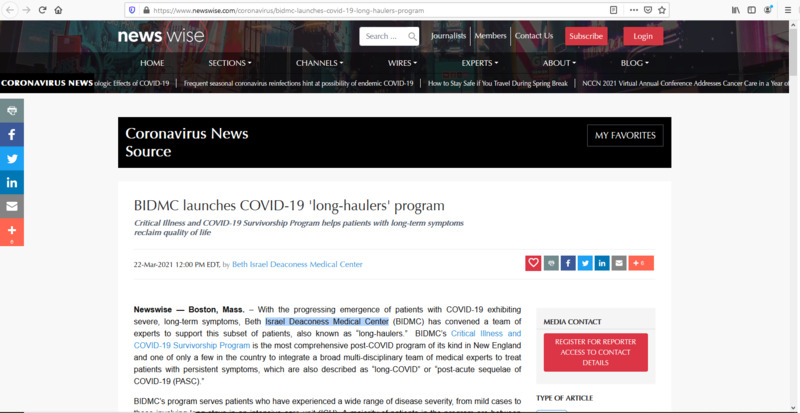 2021-03-22
2021-03-22BIDMC and Long-term Covid Patients
This article is about the new team at Beth Israel Deaconess Medical Center in Boston whose purpose will be to study and support Covid-19 patients with long-term symptoms. These "long-haulers" have an array of physical and mental problems after their recovery from Covid-19. Unfortunately, since research on this virus and it's effects are quite new, experts are still finding out more everyday. This team at BIDMC is one of a few multi-disciplinary teams in the country that is specifically established to provide comprehensive care to these "long-haulers." With so many people contracting Covid-19, teams like this will be critical in how we move forward. As a matter of public health, we need to better understand if there are physiological changes to things like our lung and airway structures, brains, and other organs from having Covid, and if they are permanently damaged or not. This team will not only help these patients, but also help discover important answers for the public as a whole.
